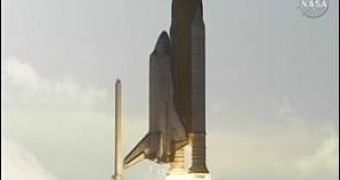Vacation is finally over for the US space program and on Friday, the space shuttle Atlantis took off at 7:38 p.m. EDT (2338 GMT), with seven crew members aboard, from its seaside launch pad 39A at Kennedy Space Center in Florida.
It's the first space shuttle flight of 2007 and puts the space program back on track after months of delays caused by technical problems, bad weather and a love triangle scandal.
"We've just been focused on our training and are ready to go," said Atlantis commander Rick Sturckow. He also said that he and his crew hadn't been distracted from their preparations for continuing construction of the space station.
All of Atlantis' astronauts were born in the United States and they are all four first-time spacefliers in the crew - Clayton Anderson, pilot Lee Archambault, Danny Olivas and Steven Swanson - and members of the astronaut class of 1998.
The launch went well, with a nearly flawless countdown, although it appeared that something fell from the tank more than two minutes into the ascent, several seconds after the solid rocket boosters separated from Atlantis.
The tanks and debris falling from it are the biggest threat to the shuttle from liftoff to around that point in the ascent. This time it was only foam that fell off the tank and the officials said it happened too late in the ascent to be a problem.
"The tank performed in a magnificent way, despite having several thousand repairs to it", said shuttle program manager Wayne Hale"(The debris) should not be a hazard that late in the flight."
The space shuttle Atlantis is the fourth operational shuttle built and one of the three fully operational shuttles remaining in the fleet. It took two and a half months to repair its external fuel tank, after a freak storm at the launch pad hurled golfball-size hail at Atlantis' 154-foot (47-meter) fuel tank, putting thousands of pockmarks in its vital insulating foam and one of the orbiter's wings.
Atlantis is carrying NASA's hopes to put the spaceflights back on track after a five-month break, with plans to carry out another 14 missions until 2010, when the shuttle fleet will be grounded, awaiting replacement with the next-generation spacecraft, Orion.

 14 DAY TRIAL //
14 DAY TRIAL //